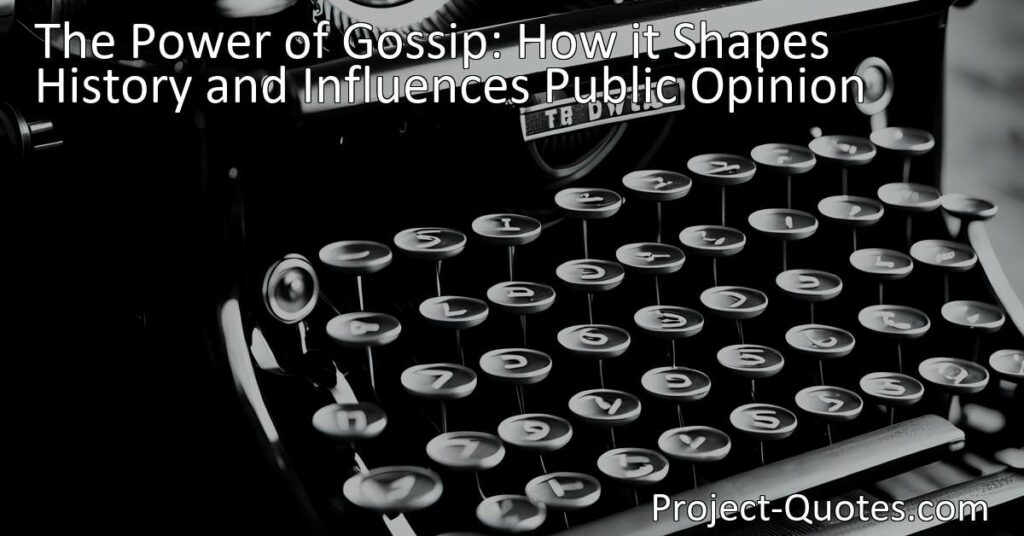All the gossip and craziness becomes a kind of sustained narrative which, in turn, can become history. It’s scary.
Barbara Kruger
“The Power of Gossip in History” explores how gossip has evolved into a influential force that shapes public opinion and even becomes a part of our collective history. Gossip has the potential to transform into sustained narratives that blur the lines between fact and fiction, shaping our understanding of events. However, by critically evaluating information, fact-checking, and seeking multiple perspectives, we can ensure that our history is based on accurate narratives.
Table of Contents
- 1 All the gossip and craziness becomes a kind of sustained narrative which, in turn, can become history. It’s scary.
- 2 Barbara Kruger
- 3 Meaning of Quote – All the gossip and craziness becomes a kind of sustained narrative which, in turn, can become history. It’s scary.
- 4 Freely Shareable Quote Image
- 5 Related
Meaning of Quote – All the gossip and craziness becomes a kind of sustained narrative which, in turn, can become history. It’s scary.
In our fast-paced and interconnected world, the phenomenon of gossip has taken on a whole new level of significance. It has become more than just idle chatter or harmless banter; it has evolved into a powerful force that shapes perceptions, influences opinions, and even shapes the fabric of our history. As the quote suggests, all the gossip and craziness that surrounds us has the potential to develop into a sustained narrative, which then becomes a part of our collective history.
Before delving into the implications of this quote, let’s first understand what gossip truly entails. Gossip can be defined as the act of sharing personal or sensational information about others, often without their knowledge or consent. It tends to spread rapidly through word of mouth, social media platforms, or even rumor mills. While gossip can sometimes be harmless and merely serve as a means of entertaining conversation, it can also have significant consequences on the individuals involved and the community as a whole.
One of the most striking aspects of gossip is its ability to transform into a sustained narrative. When gossip continues to circulate and gain momentum, it takes on a life of its own, developing into a story that people latch onto and discuss. This sustained narrative can be fueled by factors such as human curiosity, the desire for social connection, or simply because it resonates with certain people’s emotions or beliefs. Once a sustained narrative is established, it becomes difficult to distinguish fact from fiction, blurring the lines between truth and hearsay.
As the sustained narrative gains traction, it can shape people’s perceptions and influence their opinions. When we constantly hear particular stories or rumors, they start to seep into our subconscious, slowly shaping our understanding of events or individuals. This process can occur both on an individual level and a societal level. Individually, gossip can impact how we view and interact with others, potentially leading to judgments or biases based on incomplete or false information. On a societal level, sustained narratives can influence public opinion, shape election outcomes, or even fuel social movements.
Additionally, the notion that gossip can become history highlights the potential long-term consequences of this pervasive phenomenon. History is usually associated with well-documented events, comprehensive research, and reliable sources. However, in the age of instantaneous communication and information overload, gossip finds its place within the historical narrative. The events or stories that capture public attention and become part of the collective consciousness ultimately shape our understanding of the past.
Consider a historical event where gossip played a crucial role in shaping how it was perceived – the Salem witch trials. In 1692, a frenzy of accusations and trials swept through the town of Salem, Massachusetts, resulting in the execution of several individuals accused of witchcraft. The initial trigger for this hysteria was a group of young girls claiming to be possessed by witches. From there, gossip and speculation fueled the fire, leading to numerous additional accusations and subsequent trials. The sustained narrative of witches infiltrating the community became deeply ingrained in the historical record and has shaped our understanding of this dark chapter in American history.
In today’s context, where information is disseminated with lightning speed through social media, the impact of gossip on history becomes even more pronounced. The rise of citizen journalism and the ability for anyone to share their opinions and perspectives has blurred the lines between reputable news sources and unchecked speculation. False rumors and misinformation can quickly spread and become part of the historical account, distorting the truth and creating a skewed version of events.
To mitigate the potential negative consequences of gossip turning into history, it is essential to approach information critically and thoughtfully. It is crucial to verify information, fact-check, and seek multiple perspectives before forming conclusions or sharing information. In an era of fake news and sensationalism, it is our responsibility to be discerning consumers of information and to encourage others to do the same.
However, the power of gossip can also be harnessed for positive change. Sustained narratives arising from gossip can draw attention to important issues, spark conversations, and even lead to social activism. Movements such as #MeToo and Black Lives Matter began as grassroots initiatives fueled by shared experiences and stories. Through the sustained narrative of personal experiences, these movements gained momentum and ultimately brought crucial societal issues to the forefront.
In conclusion, gossip has evolved into a force that can shape our collective history. The sustained narrative that arises from gossip can influence people’s perceptions, shape public opinion, and even become ingrained in the historical record. It is essential to critically evaluate the information we encounter, fact-check and seek multiple perspectives to prevent false rumors from distorting the truth. By harnessing the power of gossip responsibly, we can foster understanding, promote positive change, and ensure that our history is based on accurate, well-informed narratives.
I hope this quote inspired image brings you hope and peace. Share it with someone who needs it today!


